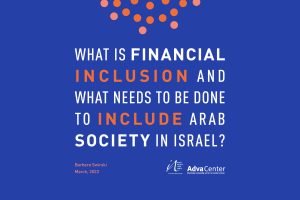A briefing paper written as a collaborative effort between the Inter-Agency Task Force on Israeli Arab Issues (IATF) and the Adva Center on the exclusion of Arab citizens from bona-fide financial services
On the individual or household level, financial inclusion is about something as simple as putting one’s money in a bank, where it can be kept safe, provide the basis for a mortgage loan to purchase or build a home, a business loan to start or grow an enterprise, or a consumer loan for unexpected household needs; serve as the basis for digital payments for goods and services; build assets to cover contingencies that always arise and facilitate the socio-economic advancement of households – as well as of whole population groups.
On the country level, the universalization of the utilization of financial services (financial inclusion) leads to an increase in the general standard of living, due to more investment possibilities, more jobs and – in general — more economic development.
In fact, the World Bank considers financial inclusion so important that it initiated “The Financial Inclusion Global Initiative,” in partnership with the Gates Foundation, among others, to encourage the initiation of financial inclusion targets in each and every country. In 2021, the World Bank produced Fintex, a comparative international index on banking and other issues connected with financial inclusion. While its focus was on developing countries, the World Bank stated that in rich countries, too, there are population groups that do not fully benefit from the financial services on offer in the country. Thus, the World Bank provided the impetus for Israel’s government to examine the state of financial inclusion in Israel and to create targets for broadening its coverage.
The Bank of Israel followed suit with a report that collated most of the data currently available, entitled (in Hebrew) “Inter-Ministerial Committee for the Creation of a National Plan for Increasing Financial Inclusion,” published in July 2022.
The Bank of Israel report provides data on two social groups whose use of financial services lags behind that of the general population: Arab citizens and Haredi Jews. The present brief will focus on Arab citizens of Israel, following Knesset Committee of the Economy discussions and the Bank of Israel 2022 report on the lacuna in financial services utilized by residents of Arab localities.
The background to the government focus on Arab society is the fact that Arab society is active financially, but that money is handled within the informal rather than the formal economy. This situation leads to older Arabs going without and younger Arabs paying more for services, especially loans. More critical, the informal economy is less forgiving than the formal one, and arrears in repayment often lead to violence, not only against the borrowers, but also against their families and against innocent passersby.
This point cannot be emphasized enough: the exclusion of Arab citizens from bona-fide financial services, for whatever reasons, results in both rampant crime and underdevelopment for individuals, households, and Israeli society as a whole. Bringing Arab citizens of Israel into the formal Israeli economy has the potential to significantly improve their welfare – as well as that of the Israeli economy. Thus, the government of Israel has established targets for increasing financial inclusion for the Arab minority, as documented most recently in Government Resolutions 922 and 550 and the Bank of Israel report.





